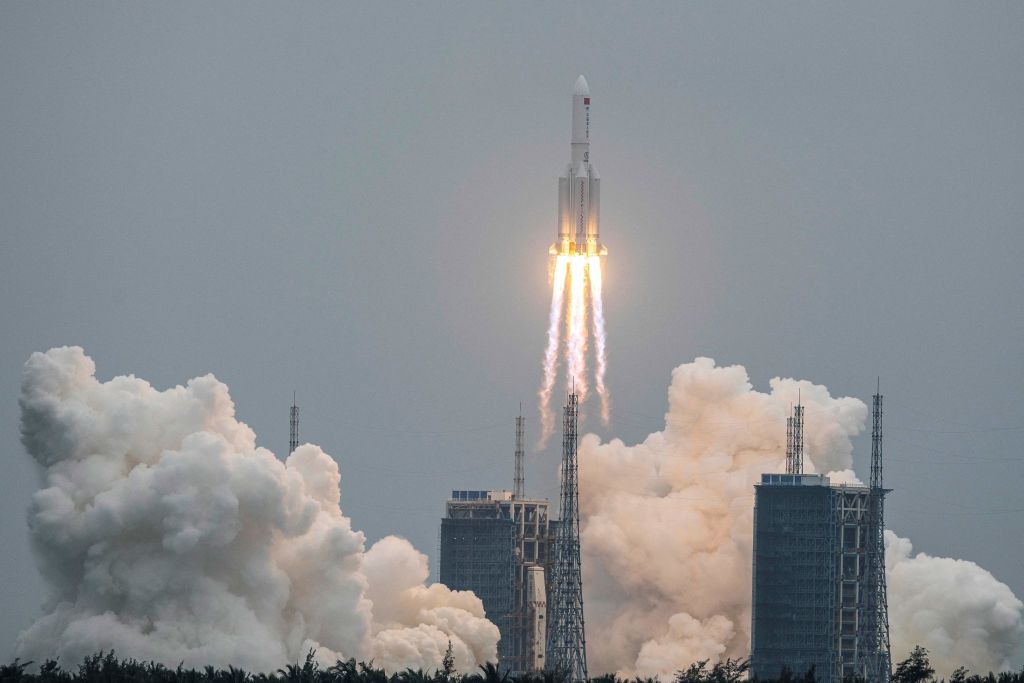China assures everyone the odds of rocket debris causing harm are 'extremely low'


A free daily email with the biggest news stories of the day – and the best features from TheWeek.com
You are now subscribed
Your newsletter sign-up was successful
Chinese officials promise a rocket that's falling toward Earth probably won't cause any harm.
Chinese Foreign Ministry spokesman Wang Wenbin said Friday officials are "closely observing" the Long March 5B rocket booster that's expected to re-enter the Earth's atmosphere this weekend, The Washington Post reports. Part of the Chinese rocket is "tumbling out of control in orbit" following a launch, The New York Times writes, but researchers are still not completely sure where the debris will land.
"This is standard international practice," Wang said Friday, per the Post. "The probability of causing harm to aviation activities and the ground is extremely low."
The Week
Escape your echo chamber. Get the facts behind the news, plus analysis from multiple perspectives.

Sign up for The Week's Free Newsletters
From our morning news briefing to a weekly Good News Newsletter, get the best of The Week delivered directly to your inbox.
From our morning news briefing to a weekly Good News Newsletter, get the best of The Week delivered directly to your inbox.
Wang also said that most of the rocket's components will burn up during re-entry. The U.S. Air Force Space Track Project on Friday projected debris will crash in a desert outside of Mary, Turkmenistan — but researchers also warned that "the projected site could be wildly off-base," the Post writes. "Its exact entry point into the Earth's atmosphere cannot be pinpointed until within hours of its re-entry which is expected around May 8," U.S. Space Command says.
NPR reports that scientists agree it's "unlikely" the booster "will actually hit someone," while adding that this still "doesn't mean there's no risk for humans." The Times may have put it best by writing, "You are almost certainly not going to be hit by a 10-story, 23-ton piece of a rocket hurtling back to Earth. That said, the chances are not zero."
Previously, debris from a Long March 5B rocket landed in Africa in 2020, leading NASA to criticize China.
"It was seemingly a successful launch, until we started getting information about a re-entry of a rocket body, a re-entry that was really dangerous," then-NASA administrator Jim Bridenstine said. "It flew over population centers and it re-entered Earth's atmosphere. It could have been extremely dangerous. We're really fortunate in the sense that it doesn't appear to have hurt anybody."
A free daily email with the biggest news stories of the day – and the best features from TheWeek.com
Brendan worked as a culture writer at The Week from 2018 to 2023, covering the entertainment industry, including film reviews, television recaps, awards season, the box office, major movie franchises and Hollywood gossip. He has written about film and television for outlets including Bloody Disgusting, Showbiz Cheat Sheet, Heavy and The Celebrity Cafe.
-
 Crisis in Cuba: a ‘golden opportunity’ for Washington?
Crisis in Cuba: a ‘golden opportunity’ for Washington?Talking Point The Trump administration is applying the pressure, and with Latin America swinging to the right, Havana is becoming more ‘politically isolated’
-
 5 thoroughly redacted cartoons about Pam Bondi protecting predators
5 thoroughly redacted cartoons about Pam Bondi protecting predatorsCartoons Artists take on the real victim, types of protection, and more
-
 Palestine Action and the trouble with defining terrorism
Palestine Action and the trouble with defining terrorismIn the Spotlight The issues with proscribing the group ‘became apparent as soon as the police began putting it into practice’
-
 Nobody seems surprised Wagner's Prigozhin died under suspicious circumstances
Nobody seems surprised Wagner's Prigozhin died under suspicious circumstancesSpeed Read
-
 Western mountain climbers allegedly left Pakistani porter to die on K2
Western mountain climbers allegedly left Pakistani porter to die on K2Speed Read
-
 'Circular saw blades' divide controversial Rio Grande buoys installed by Texas governor
'Circular saw blades' divide controversial Rio Grande buoys installed by Texas governorSpeed Read
-
 Los Angeles city workers stage 1-day walkout over labor conditions
Los Angeles city workers stage 1-day walkout over labor conditionsSpeed Read
-
 Mega Millions jackpot climbs to an estimated $1.55 billion
Mega Millions jackpot climbs to an estimated $1.55 billionSpeed Read
-
 Bangladesh dealing with worst dengue fever outbreak on record
Bangladesh dealing with worst dengue fever outbreak on recordSpeed Read
-
 Glacial outburst flooding in Juneau destroys homes
Glacial outburst flooding in Juneau destroys homesSpeed Read
-
 Scotland seeking 'monster hunters' to search for fabled Loch Ness creature
Scotland seeking 'monster hunters' to search for fabled Loch Ness creatureSpeed Read
